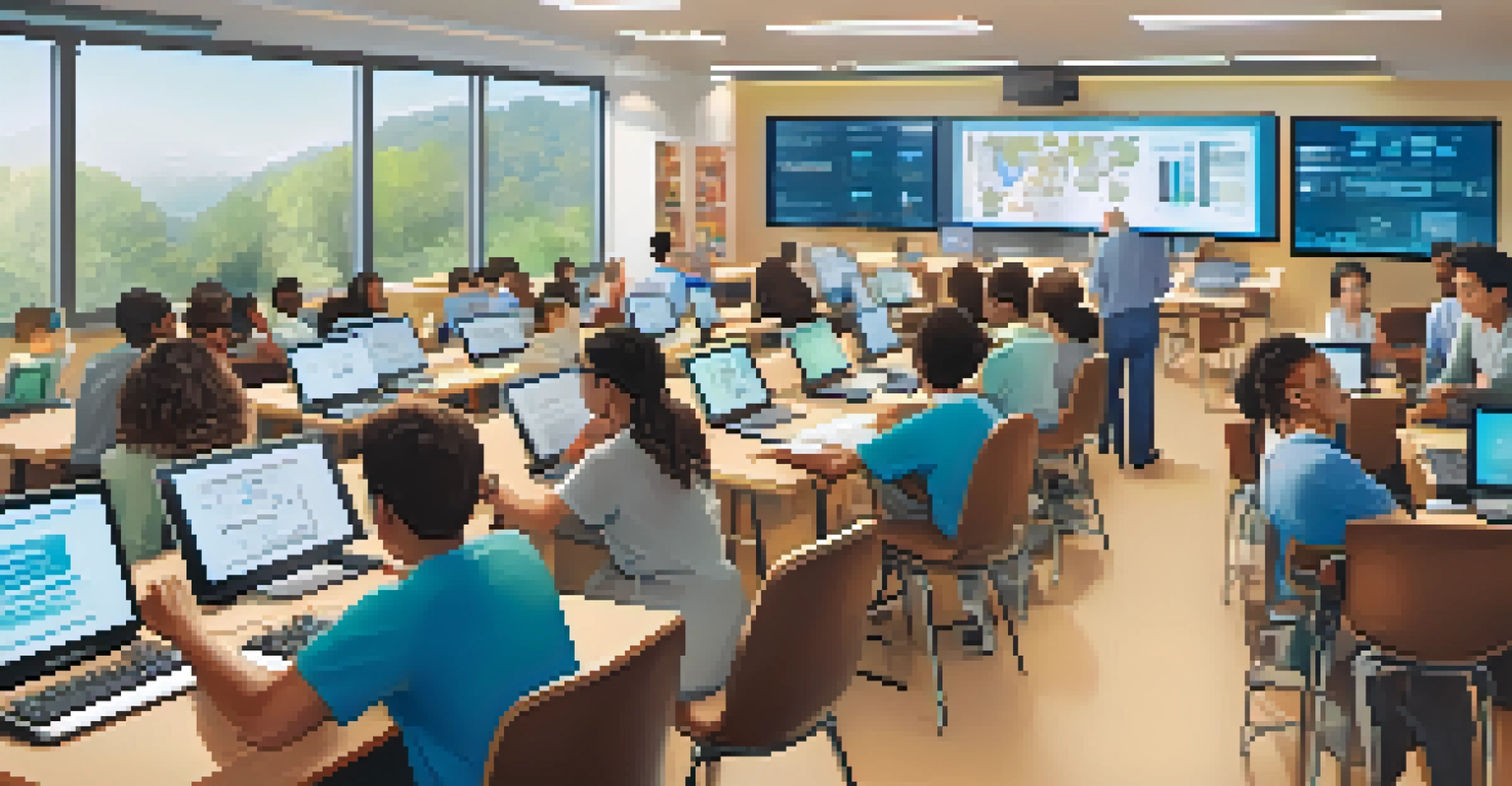Impact of Technology on Jobs in Rochester's Evolving Economy

Understanding Rochester's Economic Landscape
Rochester, known for its rich history in manufacturing and education, is seeing a significant shift in its economic landscape. This city, once dominated by traditional industries, is now embracing technology to drive growth and innovation. As we explore this transformation, it’s essential to understand the local economy's foundations to see how technology is reshaping it.
The future belongs to those who believe in the beauty of their dreams.
The rise of sectors like healthcare, education, and information technology reflects a broader national trend where cities adapt to new economic realities. Rochester’s economy is diversifying, making room for tech-driven jobs that were virtually non-existent a few decades ago. This shift is not just a local phenomenon; it mirrors changes happening across the country.
As we delve deeper, we can see how Rochester is not only adapting to new technologies but also fostering an environment for tech startups and innovation hubs. This evolution is vital for the city to remain competitive and provide job opportunities for its residents.
Technological Advancements Transforming Industries
From automation in manufacturing to telehealth in healthcare, technology is revolutionizing how industries operate in Rochester. These advancements increase efficiency but also change the skill sets needed for workers. For instance, automation can lead to the displacement of some jobs while simultaneously creating new roles focused on managing and maintaining these technologies.

A great example is the local healthcare sector, which has embraced telemedicine. This shift not only provides better access to care for patients but also creates jobs in IT and data management. As industries adopt new technologies, they must also prepare their workforce for the changes ahead.
Rochester Embraces Tech Evolution
The city is shifting from traditional industries to technology-driven sectors, diversifying its economy and creating new job opportunities.
It’s a double-edged sword; while some jobs may vanish, others are emerging, often requiring a different set of skills. This underscores the importance of continuous learning and adaptability in today’s job market.
The Rise of Remote Work and Its Implications
The COVID-19 pandemic accelerated the shift toward remote work, and Rochester is no exception. As companies adapt to this new normal, we see a growing number of remote job opportunities, allowing local talent to connect with employers beyond the city limits. This trend opens doors for many, but it also means increased competition for jobs.
Innovation distinguishes between a leader and a follower.
Remote work can lead to a better work-life balance for employees, but it also requires them to adapt to new technologies and communication tools. Skills in digital collaboration and self-discipline become essential, making it important for job seekers to enhance their tech-savviness. Employers, too, must cultivate a culture that supports remote teams effectively.
As Rochester continues to embrace remote work, it could redefine the local job market. This shift not only benefits the workforce but also attracts talent from outside the region, enriching the local economy.
Upskilling and Reskilling the Workforce
With technology evolving at a rapid pace, upskilling and reskilling are becoming vital for Rochester’s workforce. Many local organizations and educational institutions are stepping up to offer training programs that equip workers with the skills needed for tech-focused positions. This emphasis on continuous learning helps bridge the gap between traditional jobs and emerging roles.
For example, local community colleges are partnering with tech companies to develop programs tailored to current industry needs. These initiatives not only prepare students for the workforce but also help existing employees transition into new roles. This proactive approach ensures that individuals remain competitive in the job market.
Upskilling is Critical for Workers
As technology evolves rapidly, local organizations are focusing on upskilling and reskilling programs to prepare the workforce for emerging tech jobs.
As Rochester adapts to new technologies, the emphasis on upskilling can lead to a more resilient workforce. By investing in education and training, the city can foster a culture of lifelong learning that benefits both employees and employers.
Entrepreneurship and Innovation in Rochester
Rochester is becoming a hotbed for entrepreneurship, particularly in the tech sector. The city’s innovation hubs and incubators are nurturing startups that leverage technology to solve problems and create jobs. This entrepreneurial spirit not only revitalizes the local economy but also attracts talent and investment.
Local success stories, such as tech startups that originated in Rochester, showcase the potential of this burgeoning ecosystem. They demonstrate how technology can be a driving force behind job creation, providing new opportunities for skilled workers. As these startups grow, they often seek to hire locally, further benefiting the community.
The city’s support for innovation—through grants, mentorship, and networking events—plays a crucial role in fostering a vibrant entrepreneurial culture. As Rochester continues to embrace technology, its job market will likely reflect the dynamism of its startups.
Challenges of Technological Integration
While technology brings numerous benefits, it also presents challenges for Rochester’s workforce. The integration of new technologies can lead to job displacement, particularly in sectors that are slow to adapt. Employees who lack digital skills may find themselves at a disadvantage, highlighting the need for accessible training programs.
Moreover, as businesses invest in automation and AI, there’s a growing concern about the ethical implications of these technologies. Questions about job security and the future of work are becoming more prevalent. Addressing these concerns is crucial for fostering a healthy dialogue between employers, employees, and policymakers.
Remote Work Reshapes Job Market
The rise of remote work in Rochester enhances job access for locals while increasing competition, requiring adaptability and new skills from job seekers.
Rochester must navigate this delicate balance—leveraging technology to drive growth while ensuring that its workforce is prepared for the changes ahead. This journey will require collaboration among various stakeholders to create a more inclusive economic landscape.
Looking Ahead: The Future of Jobs in Rochester
As we look to the future, it’s clear that technology will continue to shape the job market in Rochester. Emerging fields such as artificial intelligence, cybersecurity, and renewable energy are poised to create new opportunities. The key will be for the city to adapt and prepare its workforce for these shifts.
Investments in education, training, and infrastructure will play a critical role in ensuring that Rochester remains competitive. Collaboration between local government, businesses, and educational institutions will be essential in crafting a workforce ready for the future. By fostering an environment of innovation, the city can attract businesses and talent alike.

Ultimately, the impact of technology on jobs in Rochester is a complex interplay of opportunities and challenges. Embracing change while supporting its workforce will be vital for the city’s continued growth and prosperity.